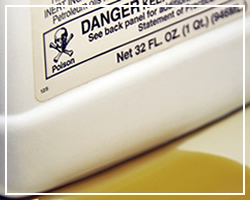Subject 8. Insurance, Records and Planning
| Site: | Extension Foundation Online Campus |
| Course: | Farm Security |
| Book: | Subject 8. Insurance, Records and Planning |
| Printed by: | Guest user |
| Date: | Thursday, July 10, 2025, 6:59 PM |
Description
Think through what you would need to do in an emergency to protect people, animals, and your business and property. Make a list of the actions you, your family and employees would need to take. Write down and keep handy important information you would need if something went wrong. An example is your list of emergency telephone numbers. Be sure that all family members and employees know where to find the information.
Insurance
In addition to the security measures presented so far, there are other steps you can take to protect your premises and family. How well you recover from a disastrous event, large or small, natural or man-made, can be an indicator of whether or not your ranch or farm has a future as a business. In this section we will look at how records and adequate insurance serve as keys to a speedier recovery following a disaster. In addition, having an emergency plan that is well thought out and has been shared with your family and employees is critical to a strong recovery.  Review all insurance policies on an annual basis, or more often if significant changes are made in structures, livestock, crops, land, equipment, liability or when your business changes, such as starting a new enterprise. Remember that the purpose of insurance is not to fix everything, but to allow you to recover and not be ruined by difficult circumstances. Review all insurance policies on an annual basis, or more often if significant changes are made in structures, livestock, crops, land, equipment, liability or when your business changes, such as starting a new enterprise. Remember that the purpose of insurance is not to fix everything, but to allow you to recover and not be ruined by difficult circumstances.
During your annual appointment with your insurance agent, review your policy to be sure it covers all assets and potential emergencies, such as theft, vandalism, pesticide spills, flooding, or terrorist attacks on your farm. Donʼt wait until you have a claim to find that your coverage is limited or nonexistent. For example, you need to know now what would happen if
Your policy may or may not cover all of the above circumstances, or it may cover some of them with exclusions. Some policies contain clauses that specify no coverage or reduced coverage under specific circumstances. For example, if you run an operation for which electricity is essential, your insurance company may require you to have generators in place to reduce damage during an extended power outage. ----- More about Insurance During your appointment with your insurance agent, discuss specific descriptions, exclusions, and amendments. Be sure you understand your own responsibility to prevent or report a loss. Some policies state a specific time frame for reporting a loss, beyond which the insurance carrier is under no obligation to pay the claim. If you have high-value crops or animals, make sure that your policy covers them beyond fair market value. Ask if enhancing or installing security measures would lower your insurance premium. Get everything in writing. There is no such thing as verbal confirmation. Insurance agents are human. They may misinterpret or misunderstand the way a company writes your policy, leaving you with inadequate coverage. Be sure to promptly review all notices and amendments you receive from your insurance company. A premium increase is the most common change that your insurance company will make, but other changes might be subtle and even more crucial. For instance, your premium may remain the same, but a portion of your coverage may be decreased or canceled. Take time to read and understand your insurance information. |
Records
|
Good recordkeeping is essential to a well-run business. But these important documents are vulnerable to theft or destruction, if not properly secured. Access to your records should be restricted to authorized personnel. Sensitive information such as personnel files, payroll, bank account numbers and finances should be stored in locked, fireproof files in a secured area and shredded when no longer needed. Other sensitive records, such as animal identifications and inventories (feed, fuel, fertilizer, pesticides, supplies and equipment), should also be kept up-to-date and secure. Computerized (digital) records are susceptible to loss, too. It seems that every week a new computer virus is crashing computers across the country, destroying valuable documents. Cyberterrorists can destroy years of data in minutes: financial and crop production records, lease contracts, and government program information. There are simple, inexpensive ways to backup your records as a safeguard against loss. For example, you can routinely back up critical files to an external hard drive, CD or jump drive. You can use cloud-based storage. Several sites provide automatic back up and secure storage service. Work with your computer service provider to be sure your computer has adequate protection. Back up your files at least once a week or more often if you regularly add information. No exceptions. Keep copies and computer back-ups of critical information and important records in a location away from your home or office. Maintain them diligently so that they are always up-to-date. Cyber Security Control all access to your farm computers to protect confidential information such as farm history and financial records. Install anti-virus software and regularly update it, and change your password often. Install software (generally termed a “fire wall”) to protect against computer hackers.
|
Plans
|
Think through what you would need to do in an emergency to What should go in your continuity of operations/emergency plan? Start with these items:
|
Disability and Estate Plans
|
What would happen on your farm or ranch if an emergency occurred Decide who should be the back-up person and make sure they know enough about the operation and are authorized to make critical decisions. Share any plans and information you have developed with them. Consider providing a Durable Power of Attorney to be used in emergency situations. Be sure to provide the name and contact information for designated individual to your emergency information for responders.
What would happen if the primary decision maker becomes disabled? Can your farm business survive? Decide who will carry on farm operations, either temporarily or permanently. Be sure to discuss this with them. Are you interested in keeping your farm or ranch in the family? Are your children interested in continuing the farm business? Think through how you will transfer the farm business to the next generation. Don’t expect your children to understand how the operation works unless you teach them. Provide opportunities for them to make decisions and learn. While no one likes to think about it, you and your business partners/family should have an estate plan in place to ensure your heirs can continue to farm if you unexpectedly die. Learn more about estate planning. Contact your lawyer for assistance. |
Spill Response Plan
Spills of manure, fuel, fertilizer or pesticides can endanger humans,  animals, your property and the environment. Damage from spills may also be a liability threat to your business. What would you do if a vandal opened the valves on your pesticide or fuel tank? Develop a plan to handle spills quickly and efficiently. Your plan of action might include
|


